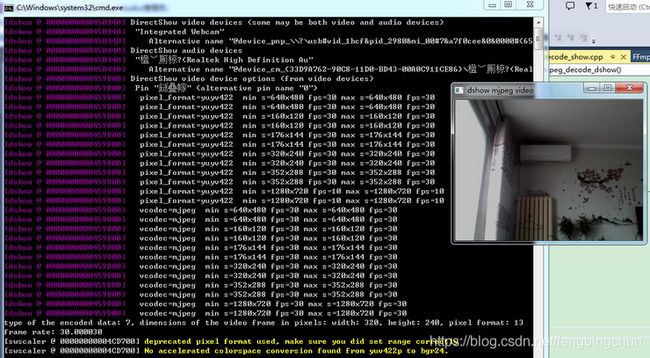FFmpeg在Windows上通过dshow编解码方式设置为mjpeg并实时显示测试代码
Windows上默认的内置摄像头一般支持两种编解码格式:rawvideo和mjpeg。在调用FFmpeg接口时默认的采用rawvideo。这里通过DirectShow实现为mjpeg进行编解码。
通过命令行调用FFmpeg可执行文件:
(1). 可获取Windows上连接的视频设备,命令如下:
ffmpeg.exe -list_devices true -f dshow -i dummy(2). 可获取指定视频设备支持的编解码格式和video size,命令如下:
ffmpeg.exe -f dshow -list_options true -i video="Integrated Webcam"这里通过C++实现获取连接的视频设备,代码如下:
AVFormatContext* format_context = avformat_alloc_context();
AVDictionary* dict = nullptr;
av_dict_set(&dict, "list_devices", "true", 0);
AVInputFormat* input_format = av_find_input_format("dshow");
avformat_open_input(&format_context, "", input_format, &dict);
avformat_close_input(&format_context);
av_dict_free(&dict);这里通过C++实现支持的编解码格式和video size,代码如下:
AVFormatContext* format_context = avformat_alloc_context();
AVDictionary* dict = nullptr;
av_dict_set(&dict, "list_options", "true", 0);
AVInputFormat* input_format = av_find_input_format("dshow");
avformat_open_input(&format_context, "video=Integrated Webcam", input_format, &dict); // video=video device name
avformat_close_input(&format_context);
av_dict_free(&dict);设置编解码格式通过av_dict_set好像不能成功,这里是通过AVFormatContext的video_codec_id进行设置,通过av_dict_set设置帧率好像也不能成功。通过调用OpenCV的接口进行实时显示,代码如下:
#include "funset.hpp"
#include
#include
#include
#include
#include
#include
#include "common.hpp"
#ifdef __cplusplus
extern "C" {
#endif
#include
#include
#include
#include
#include
#include
#ifdef __cplusplus
}
#endif
#include
#ifdef _MSC_VER
int test_ffmpeg_decode_dshow()
{
avdevice_register_all();
AVCodecID id = AV_CODEC_ID_MJPEG;
AVCodec* encoder_id = avcodec_find_encoder(id);
AVCodec* decoder_id = avcodec_find_decoder(id);
if (!encoder_id || !decoder_id) {
fprintf(stderr, "codec not found: %d\n", id);
return -1;
}
AVFormatContext* format_context = avformat_alloc_context();
format_context->video_codec_id = id; // 指定编解码格式
AVInputFormat* input_format = av_find_input_format("dshow");
AVDictionary* dict = nullptr;
//if (av_dict_set(&dict, "vcodec"/*"input_format"*/, "mjpeg", 0) < 0) fprintf(stderr, "fail to av_dict_set: line: %d\n", __LINE__); // 通过av_dict_set设置编解码格式好像不起作用
if (av_dict_set(&dict, "video_size", "320x240", 0) < 0) fprintf(stderr, "fail to av_dict_set: line: %d\n", __LINE__);
//if (av_dict_set(&dict, "r", "25", 0) < 0) fprintf(stderr, "fail to av_dict_set: line: %d\n", __LINE__); // 通过av_dict_set设置帧率好像不起作用
int ret = avformat_open_input(&format_context, "video=Integrated Webcam", input_format, &dict);
if (ret != 0) {
fprintf(stderr, "fail to avformat_open_input: %d\n", ret);
return -1;
}
ret = avformat_find_stream_info(format_context, nullptr);
if (ret < 0) {
fprintf(stderr, "fail to get stream information: %d\n", ret);
return -1;
}
int video_stream_index = -1;
for (unsigned int i = 0; i < format_context->nb_streams; ++i) {
const AVStream* stream = format_context->streams[i];
if (stream->codecpar->codec_type == AVMEDIA_TYPE_VIDEO) {
video_stream_index = i;
fprintf(stdout, "type of the encoded data: %d, dimensions of the video frame in pixels: width: %d, height: %d, pixel format: %d\n",
stream->codecpar->codec_id, stream->codecpar->width, stream->codecpar->height, stream->codecpar->format);
}
}
if (video_stream_index == -1) {
fprintf(stderr, "no video stream\n");
return -1;
}
fprintf(stdout, "frame rate: %f\n", av_q2d(format_context->streams[video_stream_index]->r_frame_rate));
AVCodecParameters* codecpar = format_context->streams[video_stream_index]->codecpar;
const AVCodec* codec = avcodec_find_decoder(codecpar->codec_id);
if (!codec) {
fprintf(stderr, "fail to avcodec_find_decoder\n");
return -1;
}
if (codecpar->codec_id != id) {
fprintf(stderr, "this test code only support mjpeg encode: %d\n", codecpar->codec_id);
return -1;
}
AVCodecContext* codec_context = avcodec_alloc_context3(codec);
if (!codec_context) {
fprintf(stderr, "fail to avcodec_alloc_context3\n");
return -1;
}
codec_context->pix_fmt = AVPixelFormat(codecpar->format);
codec_context->height = codecpar->height;
codec_context->width = codecpar->width;
codec_context->thread_count = 16;
ret = avcodec_open2(codec_context, codec, nullptr);
if (ret != 0) {
fprintf(stderr, "fail to avcodec_open2: %d\n", ret);
return -1;
}
AVPixelFormat dst_pixel_format = AV_PIX_FMT_BGR24;
AVFrame* frame = av_frame_alloc();
AVPacket* packet = (AVPacket*)av_malloc(sizeof(AVPacket));
SwsContext* sws_context = sws_getContext(codec_context->width, codec_context->height, codec_context->pix_fmt, codec_context->width, codec_context->height, dst_pixel_format, 0, nullptr, nullptr, nullptr);
if (!frame || !packet || !sws_context) {
fprintf(stderr, "fail to alloc\n");
return -1;
}
uint8_t *bgr_data[4];
int bgr_linesize[4];
av_image_alloc(bgr_data, bgr_linesize, codec_context->width, codec_context->height, dst_pixel_format, 1);
cv::Mat mat(codec_context->height, codec_context->width, CV_8UC3);
const char* winname = "dshow mjpeg video";
cv::namedWindow(winname);
while (1) {
ret = av_read_frame(format_context, packet);
if (ret >= 0 && packet->stream_index == video_stream_index && packet->size > 0) {
ret = avcodec_send_packet(codec_context, packet);
if (ret < 0) {
fprintf(stderr, "##### fail to avcodec_send_packet: %d\n", ret);
av_packet_unref(packet);
continue;
}
ret = avcodec_receive_frame(codec_context, frame);
if (ret < 0) {
fprintf(stderr, "##### fail to avcodec_receive_frame: %d\n", ret);
av_packet_unref(packet);
continue;
}
sws_scale(sws_context, frame->data, frame->linesize, 0, codec_context->height, bgr_data, bgr_linesize);
mat.data = bgr_data[0];
cv::imshow(winname, mat);
} else if (ret < 0 || packet->size <= 0) {
fprintf(stderr, "##### fail to av_read_frame: %d, packet size: %d\n", ret, packet->size);
continue;
}
av_packet_unref(packet);
int key = cv::waitKey(30);
if (key == 27) break;
}
cv::destroyWindow(winname);
sws_freeContext(sws_context);
av_frame_free(&frame);
av_freep(packet);
av_freep(&bgr_data[0]);
avformat_close_input(&format_context);
av_dict_free(&dict);
}
fprintf(stdout, "test finish\n");
return 0;
}
#else
int test_ffmpeg_decode_dshow()
{
fprintf(stderr, "Error: this test code only support windows platform\n");
return -1;
}
#endif 执行结果如下:
GitHub:https://github.com/fengbingchun/OpenCV_Test
